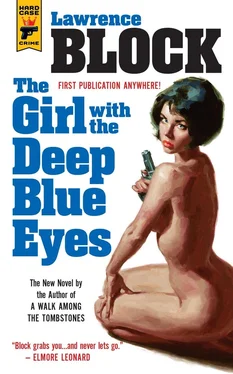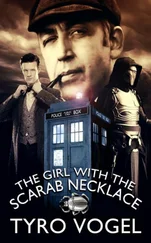The first page was an explanation. It had taken him several drafts to get it right, laying it all out, telling her that her friend Gonson had gone straight to the sheriff, that he’d been hired to get her to incriminate herself and capture the evidence on a recording. A denial wouldn’t help her right now, and the best course of action for her was not to say a word.
NOD IF YOU UNDERSTAND.
She raised her eyes to his, then returned them to the yellow pad. And nodded.
THE NEXT PAGES ARE A SCRIPT. IT’S THE CONVERSATION YOU AND I ARE GOING TO HAVE. READ IT ALL THE WAY THROUGH SILENTLY. DO THAT THREE TIMES.
She looked at him, puzzled. He nodded, and she thought a moment, and answered his nod with her own.
After the silent reading, a single rehearsal. He had his own copy of the script, and they sat side by side, he behind the wheel, she in the passenger seat, and read their lines in turn. He stopped her once to correct her emphasis on one line, but otherwise he let her go straight through it.
A little stiff overall, he thought, but maybe stiff was okay. It was better for her to be slightly wooden rather than overly and unconvincingly expressive.
Another run-through wouldn’t hurt a bit, but it would take time, and they didn’t have it to spare. Time to go with what they had.
He clipped the rig together again, pressed Play:
“Recorded in the parking lot of the Winn-Dixie supermarket on Cable Boulevard in Belle Vista, Gallatin County, Florida, this sixteenth day of April in the year two thousand fourteen. Participants are J. W. Miller and Lisa Yarrow Otterbein.”
He hit Pause. They looked at each other, and he hit Record and cued her. She took a breath, steeled herself, and went for it.
“I don’t know how to say this.”
“Hey, take your time.”
“Look, I made a big mistake. I was upset, I was angry, and I told... I don’t want to say his name.”
“I know who you mean.”
“I never thought he’d take me seriously. I certainly didn’t take it seriously myself, and when he got back to me and told me he’d made arrangements with you, I didn’t know what to think.”
All the way through to the end of it. Turning pages carefully, trying to avoid a rustling sound that the wire might pick up.
All the way through to:
“Some bugs, you know, you can’t just take ’em outside. They keep coming back until someone gets rid of ’em for you.”
(sound of a car door opening)
“No, I’m not, I don’t, no.”
“Whatever you say.”
“I was out of my mind with anger, and I poured a couple of drinks on top of the anger, and I said something crazy and even while I was saying it I knew I wasn’t serious, I couldn’t possibly be serious. I’m going now. This is over, okay? Because I really want this to be over.”
He stopped the tape, nodded to indicate his satisfaction with her performance. Then he switched it on again to record his wrap-up: “Recorded at the Winn-Dixie lot, morning of April sixteenth, year is twenty-fourteen. Participants are J. W. Miller and Lisa Yarrow Otterbein. Over and out.”
Then one last page for her to read over in silence, explaining that this would cover her, but that she could never again try to find anybody to kill her husband or anybody else, that the two of them could never be seen together in public, that they could never talk on the phone or communicate by text or email, that all of those forms of communication left an ineradicable trail that could put them both behind bars.
When she finished he took the pad from her, printed rapidly in the usual block caps:
I NEED TO SEE YOU TONIGHT. WHEN DO YOU GET OFF WORK?
She took the pen, wrote: I COULD CALL IN SICK.
He shook his head. AFTER WORK IS BETTER.
11:15. TOO LATE?
11:15 OK. WHERE? GOT TO BE WHERE NOBODY EITHER OF US KNOWS WILL SHOW UP, NOT IN OR NEAR GALLATIN COUNTY.
She had to give it some thought.
SOMEPLACE YOU KNOW BUT NEVER GO TO, he added.
And then she came up with Kimberley’s Kove, and wrote down the name and location and how to get there.
MIDNIGHT?
MIDNIGHT.
Midnight would work. Midnight was fine.
He asked her what she’d like from the bar. She looked at his Pabst longneck, shook her head. “Not beer,” she said. “And this is no place to get fancy. You wouldn’t want to ask them to make you a mixed drink.”
“ ‘Shucks, ma’am, we’s just plain country folks here.’ ”
“I wonder what the wine’s like.”
“Red or white?”
“That’d be the two choices. Oh, white, I guess.”
He went to the bar and came back with four ounces of white wine in a small water tumbler. She raised the glass and he touched it with his beer bottle.
“Well, it could be worse,” she said, after a small sip. “Although it doesn’t taste much like wine.”
She offered him the glass. He noted the trace of her lipstick on the rim, and allowed himself to drink from the same spot.
“I see what you mean,” he said. “Maybe it’s not.”
“What else could it be?”
“Sour grape juice, watered down some and spiked with grain alcohol.”
“People do that? Why would anyone—”
“Same reason they’d make any kind of bootleg,” he said. “It’s cheaper.”
“You’d think jug wine would be cheap enough.” She took another experimental sip, then said, “Oh, and consider yourself kissed.”
“Huh?”
“We both drank from the same spot on the same glass. ‘Consider yourself kissed’ is what you say when that happens. You never heard that before?”
“No.”
“I guess we know different things. You know how to make bad wine and I know what passed for sophisticated wit at Foxcroft.”
“Is that where you went to school?”
“Not exactly. Jacob Tendler High, on Goodrich two blocks off Hennepin.”
“Hennepin.”
“That ring a bell?”
“It’s a main drag somewhere, isn’t it? Minnesota?
“Minneapolis. What did you do, read it somewhere?”
“Read it or heard it on the news, and evidently it got stuck in my mind. That’s where you’re from? Minneapolis?”
“A few different places, and Minneapolis was one of them. My mother kept hooking up with men who felt a need to relocate. Then they’d do it again, only this time they wouldn’t tell her, and she’d have to go and hook up with somebody else, some other shifty-eyed loser with an urge for going. I got the same urge myself one day, hopped on a bus and left the driving to Greyhound.”
“And the Foxcroft lingo?”
“Lingo,” she said. “I like that. At Foxcroft we’d say patois . Or maybe we wouldn’t, maybe I’m misusing the word. ‘Consider yourself kissed.’ I read it in a book, and it stuck in my mind the way Hennepin did in yours. Don’t ask me which book because I read so many of them, all about these preppy girls. Oh, isn’t that Emmy Lou? What’s the matter?”
“I thought there wouldn’t be anybody here that you know.”
“Well, I know her, but she wouldn’t know me from Eve. On the jukebox, Emmy Lou Harris.”
“Oh.”
She lifted her glass, set it down untasted. “I’ve never been here before,” she said, “and I don’t know any of these people except the ones on the jukebox, and I can’t say I want to. I picked this place because I remembered seeing it from the road and thinking how perfectly lowdown it looked, but aside from that I don’t know anything more about it than I do about Foxcroft or Miss Porter’s. I don’t even know your name.”
“It’s Doak.”
“And mine’s Lisa, but you know that. You know a whole lot more about me than I know about you.”
Читать дальше












